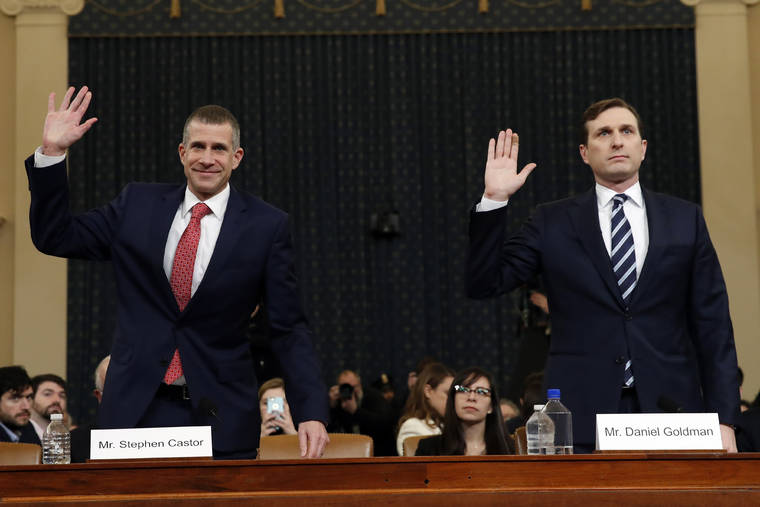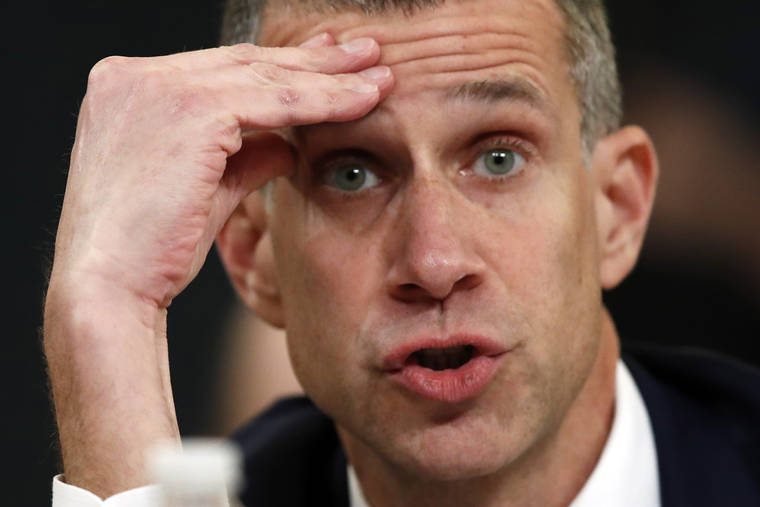House impeachment hearing gets rancorous as lawyers testify




WASHINGTON Top House lawyers sparred with lawmakers and each other in an acrimonious hearing Monday over the impeachment case against President Donald Trump as Democrats prepare formal charges.
WASHINGTON — Top House lawyers sparred with lawmakers and each other in an acrimonious hearing Monday over the impeachment case against President Donald Trump as Democrats prepare formal charges.
Democrats insisted that Trump’s push to have Ukraine investigate rival Joe Biden while withholding U.S. military aid ran counter to U.S. policy and benefited Russia as well as himself. But in one testy exchange, Republican attorney Stephen Castor dismissed the transcript of Trump’s crucial call with Ukraine as “eight ambiguous lines” that did not amount to the president seeking a personal political favor.
Democrats argued vigorously that Trump’s meaning could not have been clearer in seeking political dirt on Biden, his possible opponent in the 2020 election.
The chief Democratic investigator, Daniel Goldman, asked for his view, testified, “I don’t think there’s any other way to read the words on the page.” Goldman is the top Democratic counsel on the Intelligence Committee.
The Judiciary Committee is reviewing the findings of the Intelligence panel’s 300-page report ahead of a vote, possibly as soon as this week, on two or more articles of impeachment on charges of abuse of power, bribery and obstruction against the Republican president. A vote in the full House could come before Christmas.
From the White House, Trump tweeted repeatedly, assailing the “Witch Hunt!” and “Do Nothing Democrats.”
The top Republican on the Judiciary panel, Rep. Doug Collins of Georgia, demanded to hear from Rep. Adam Schiff, the chairman of the Intelligence Committee, whose report provides the foundation for articles of impeachment. Schiff declined to appear, sending the panel’s chief counsel to argue the case.
The hearing sets off a pivotal week as Democrats march toward a full House vote expected by Christmas. In drafting the articles of impeachment, Speaker Nancy Pelosi is facing a legal and political challenge of balancing the views of her majority while hitting the Constitution’s bar of “treason, bribery or other high crimes and misdemeanors.”
Judiciary Committee Chairman Jerrold Nadler was blunt as he opened the hearing, saying, “President Trump put himself before country.”
Collins said Democrats are racing to jam impeachment through on a “clock and a calendar” ahead of the 2020 presidential election.
“They can’t get over the fact that Donald Trump is the president of the United States, and they don’t have a candidate that can beat him,” Collins said.
Nadler said the case against Trump is clear after “multiple officials testified that the president’s demand for an investigation into his rivals was a part of his personal, political agenda, and not related to the foreign policy objectives of the United States.
“The integrity of our next election is at stake.”
The Republicans tried numerous times to halt or slow the proceedings, formally objecting several times that the committee’s Democratic counsel was impugning Trump as he spelled out potential charges. Nadler responded that negative comments about Trump might well be expected in listing reasons to impeach him. The Republicans demanded roll call votes several times, including on taking breaks and “taking down” the negative comments, all defeated on party-line votes.
The hearing was briefly interrupted by a protester shouting “We voted for Donald Trump!” and decrying Democrats as the ones committing “treason.” The protester was escorted from the House hearing room by Capitol Police.
Trump spent the morning tweeting against the proceedings. He and and his allies acknowledge he likely will be impeached in the Democratic-controlled House, but they also expect acquittal next year in the Senate, where Republicans have the majority. Trump’s team is turning attention elsewhere, including Monday’s release of a long-awaited Justice Department report into the 2016 Russia investigation.
That watchdog report found that the FBI was justified in opening its investigation into ties between the Trump presidential campaign and Russia and that the FBI did not act with political bias, despite “serious performance failures” up the bureau’s chain of command.
Those findings undercut Trump’s claim that he was the target of a “witch hunt,” rejecting theories and criticism spread by Trump and his supporters. Yet it found errors and misjudgments likely to be exploited by Republican allies as the president faces probable impeachment.
The White House is refusing to participate in the impeachment process, and Collins asked to postpone Monday’s hearing, criticizing Democrats for moving too swiftly.
Trump, meanwhile, is heading out for campaign rallies shifting attention away from the House. Over the weekend, he was focused on a related matter, the Justice Department inspector general’s findings on the FBI’s decisions to investigate Russian interference in the 2016 election. The president has long called special counsel Robert Mueller’s Russia probe a “witch hunt.”
Trump tweeted Sunday, “I.G. report out tomorrow. That will be the big story!”
Democrats say Trump abused his power in a July 25 phone call when he asked Ukrainian President Volodymyr Zelenskiy for a favor in investigating Democrats. That was bribery, they say, since Trump was withholding nearly $400 million in military aid that Ukraine depended on to counter Russian aggression.
Trump said over the weekend that his personal attorney Rudy Giuliani wants to take the information gathered from Giuliani’s investigations and a recent trip to Ukraine to the U.S. attorney general and to Congress.
Trump and his aides have made clear that they now see his impeachment in the House as inevitable and have shifted their focus. A vote to convict requires a two-thirds vote of the Senate, where Republicans hold 53 of 100 seats. It is unlikely that Republican senators would cross party lines and vote to remove Trump from office.
As Democrats draft the articles, Pelosi’s challenge will be to go broad enough to appease her liberal flank, which prefers a more robust accounting of Trump’s actions reaching back to Mueller’s findings. At the same time, centrist lawmakers prefer charges more tailored to Ukraine. Democratic leaders were to meet Monday evening.
Nadler, in television interviews, declined to say ultimately how many articles of impeachment Democrats will present but said they will involve “certainly abuse of power” and likely “obstruction of Congress.”
He pointed to a “pattern” of conduct by Trump in seeking foreign interference in elections but would not commit to including the evidence of obstruction of justice in Mueller’s Russia investigation as part of the articles of impeachment.
In his report, Mueller said he could not determine that Trump’s campaign conspired or coordinated with Russia in the 2016 election. But Mueller said he could not exonerate Trump of obstructing justice in the probe and left it for Congress to determine.
Associated Press writers Laurie Kellman, Matthew Daly, Eric Tucker, and Darlene Superville contributed to this report.


